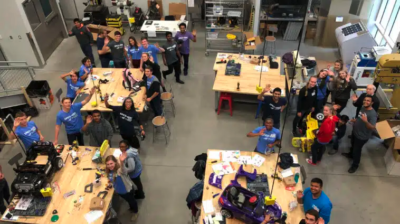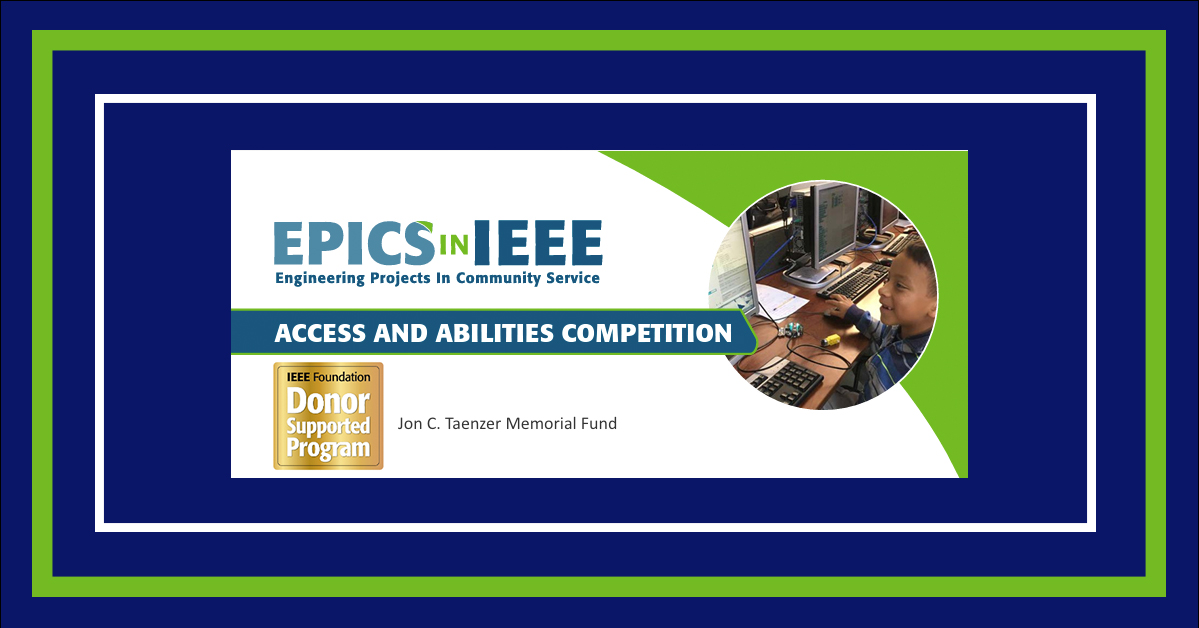Selected from more than 50 proposals, these projects will involve student teams from around the world and are expected to help make the world more accessible for all.
 EPICS in IEEE is proud to announce 23 new service learning projects selected as part of its Access and Abilities Competition. The competition was supported by the Jon C. Taenzer Memorial Fund established by the IEEE Foundation in 2019 with a generous bequest from the Estate of Mr. Taenzer, an IEEE Life Senior Member. The fund is restricted for the purpose of supporting engineers in developing countries and to support breakthroughs in aids for the disabled.
EPICS in IEEE is proud to announce 23 new service learning projects selected as part of its Access and Abilities Competition. The competition was supported by the Jon C. Taenzer Memorial Fund established by the IEEE Foundation in 2019 with a generous bequest from the Estate of Mr. Taenzer, an IEEE Life Senior Member. The fund is restricted for the purpose of supporting engineers in developing countries and to support breakthroughs in aids for the disabled.
“We are grateful to the IEEE Foundation and the Jon C. Taenzer Memorial Fund for their generous contribution to EPICS in IEEE. With these funds, 23 different groups of students will be working in their communities on prototypes to assist people through the Access and Abilities Competition. It is great to see the potential of IEEE student members to change the world start to be realized through this program.” Jamie Moesch, Managing Director, Educational Activities.
The project titles and locations are provided below. Stay connected with EPICS in IEEE through its mailing list to see how these projects progress. They will be sharing stories about the impact on both the communities served and the students involved in the competition.
Access and Abilities Competition Projects
 Thanks to the funding received from the Jon C. Taenzer Memorial Fund, EPICS in IEEE approved and funded these 23 projects with a total value of $88,000.
Thanks to the funding received from the Jon C. Taenzer Memorial Fund, EPICS in IEEE approved and funded these 23 projects with a total value of $88,000.
- IoT-based Smart Assistant Cane for the Visually Impaired- IEEE Madras Section
- Smart Outdoor Wheel Chair using IOT for the Paralyzed-IEEE Madras Section
- Smart Fall Detection Tiles for Disabled People-IEEE Madras Section
- Wheelchair Electric Assist Taenzer Fund- IEEE Eastern Carolina Section
- Smart Glove- IEEE Karachi Section
- Emergency Evacuation System for Disabilities in Wheelchair- IEEE Fort Wayne Section
- Sound Detection System- IEEE Toronto Section
- Design and Development of a Low-Cost Stair Lift-IEEE Karachi Section
- Elderly People Fall Detection System Using Radar Technology-IEEE Islamabad Section
- Self-Navigating Robotic Walking Aid for Elderly People Using Multi-Sensor Fusion-Based Human Tracking- IEEE Sarawak Section
- Artificial Robotic Material (ARM) for Treating Motor Disorders in Children- IEEE Madras Section
- MindVoice, EEG-Enhanced Voice Assistance for Older Adults-IEEE Buffalo Section
- Soft Robotic Glove for Fine Motor Rehabilitation and Task-specific Training- IEEE Peru Section
- Smart E-TRIKE with Detachable Wheels for Disabled Students to Enhance their Competency Taenzer Fund-IEEE Madras Section
- Adaptive Mouse – USA-IEEE Gainesville Section
- Soft Exosuit for Ambulatory Patients with Spinal Muscular Atrophy (SMA)-IEEE North Jersey Section
- Closing the Gap in Engineering Education for People with Disabilities- IEEE Panama Section
- Developing and Testing an Automated Ramp to Ease Accessibility to Spaces for Persons with Disabilities and Vulnerable Members of Society- IEEE Uganda Section
- Aural Rehabilitation for Children in Tamil Language-IEEE Madras Section
- Smart Mobile Inclusive Learning (SMILE): AI-driven multi-purposed therapy for disability children- IEEE Indonesia Section
- An Eye For the Blind-IEEE Kerala Section
- BLUE PEW- IEEE Indonesia Section
- Disability Smart Toilet for Sustainable Use within Communities-IEEE Uganda Section
Interested in supporting and helping to enable more service-learning programs for students through EPICS in IEEE, donate now.
Article originally published on the IEEE Foundation website.


